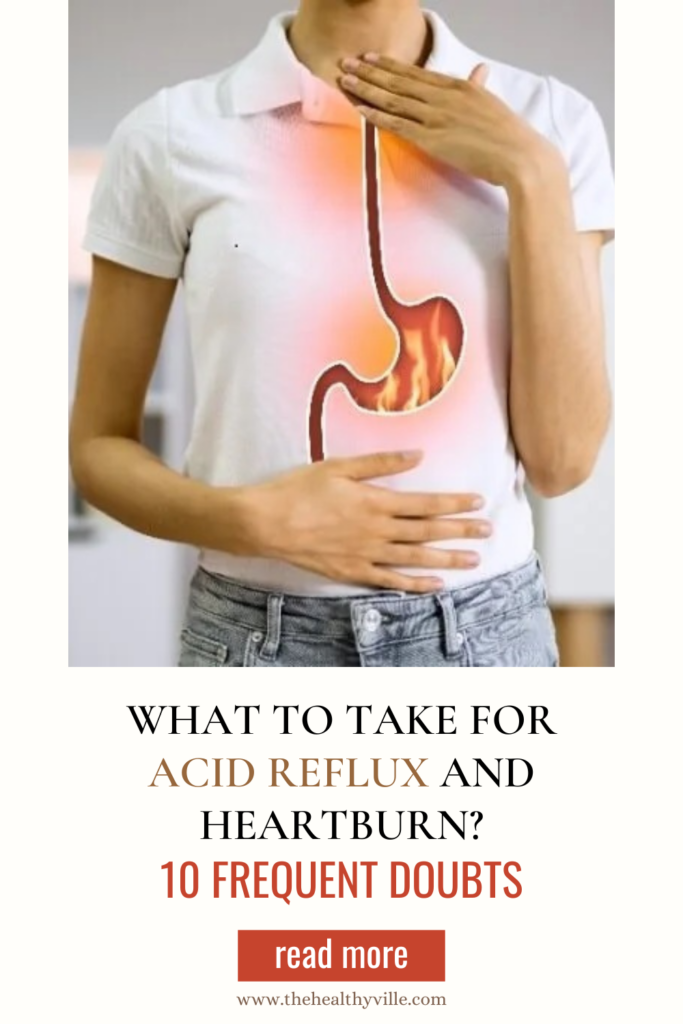What to take for acid reflux? Do you suffer from heartburn? Are you overwhelmed by the amount of doubts you have about it? Get the answers.
Heartburn and reflux are two of the most frequent causes of consultation for gastrointestinal symptoms. Gastroesophageal reflux is one of the most common diseases because it affects around 20% of the population. It manifests with symptoms including a burning sensation in the pit of the stomach, regurgitation, and a bitter sensation in the mouth.
Both heartburn and occasional reflux are harmless. However, when the symptoms do not improve with treatment or are sustained over time, they require a medical consultation. If you have doubts about it, continue reading because we will solve them one by one.
-
What is acidity?
Heartburn is the term given to the burning sensation that occurs in the “mouth of the stomach” (epigastrium), as a result of the reflux of gastric acid.
The burning sensation is usually centered in the middle of the chest, above or below the breastbone. It can be intermittent or fixed, and sometimes, instead of burning, it can manifest as pressure.
-
What happens in heartburn and reflux?
Problems in the lower esophageal sphincter cause acid to back up into the esophagus.
Acid reflux, or gastroesophageal reflux disease, occurs due to a deficiency in the antireflex barrier of the esophagus. To prevent gastric contents from returning from the stomach to the esophagus, there is a valve called the “lower esophageal sphincter”, which prevents acid from returning to the esophagus.
When this valve is compromised, there is a reflux of acid into the esophagus that irritates it, generating the symptoms of a burning sensation, regurgitation, nausea, and others.
-
What are the dangers of acid reflux?
Heartburn and reflux can cause chronic irritation of the esophagus. It can, in turn, cause changes in the lining of the esophagus, developing morphological changes that trigger Barrett’s esophagus. This pathology could increase the risk of developing esophageal cancer.
In addition, acidity can cause ulcers and stenosis or narrowing, which can affect the respiratory system by producing laryngitis, asthma, chronic cough, voice changes, or recurrent upper and lower respiratory infections.
-
What foods can exacerbate heartburn?
Although heartburn and reflux are very common, symptoms can be made worse by a variety of foods, such as:
- Spicy foods.
- Onion.
- Citrus.
- Tomatoes.
- Fried or fatty foods.
- Mint.
- Chocolate.
- Sauces.
- Copious meals.
- Consumption of alcoholic, carbonated, coffee or caffeinated beverages.
-
Besides food, what else can exacerbate the symptoms?
Acid reflux can aggravate by other situations such as:
- Excess abdominal fat.
- Pregnancy.
- Wear tight clothing.
- The use of belts.
-
When should we worry about acidity?
If the discomfort is persistent, you should consult your doctor.
The occasional and intermittent presence of heartburn and reflux may not be important. Except in those cases in which it manifests frequently, interferes with daily routines, does not improve with the use of medications or worsens over time. In all these situations, it requires timely medical evaluation.
Other symptoms that should attract attention are:
- Blackish or tarry vomit.
- Difficulty or pain swallowing.
- Vomit with blood.
- Unexpected weight loss.
-
What helps in treating reflux and heatburn?
Gastroesophageal reflux treatment includes:
- Changes in diet and lifestyle.
- Avoid caffeine, spicy food, mint, chocolate, and alcoholic beverages.
- Sleep with your head slightly elevated (at 30 degrees).
- Do not lie on a flat surface for the first 60 minutes after eating.
- Eat smaller meals more frequently.
- Do not eat food in the 3 hours before sleeping.
- Medical therapy aimed at neutralizing acid.
- Medical treatment for gastroesophageal reflux seeks to neutralize or decrease gastric acid.
-
What to take for acid reflux?
When patients ask what to take for acid reflux, doctors recommend, in addition to antacids, to use proton pump inhibitors or histamine receptor blockers. The former neutralize excess stomach acid to improve the feeling of heartburn.
On the other hand, proton pump inhibitors directly inhibit hydrochloric acid production, just as histamine receptor blockers do so indirectly.
However, long-term use and high doses can cause an increased risk of osteoporosis, serious infections, or magnesium deficiency that can affect heart rhythm.
-
Are there foods that help heartburn and reflux?
Heartburn can benefit from eating foods that have a high mucilage content and emollient properties that protect the stomach lining and reduce symptoms. These foods include bananas, pumpkin, zucchini, cooked carrots or potatoes, oats, turmeric, and almonds.
-
Are there drugs that can exacerbate them?
Some drugs, such as progesterone and some antidepressants, affect the lower esophageal sphincter. In this way, they favor the appearance of gastroesophageal reflux.
When heartburn and reflux are not intermittent, they require medical evaluation.
The reflux of gastric acid from the stomach into the esophagus generates various symptoms: burning sensation, discomfort, bitter taste, difficulty or pain in swallowing and abdominal distension. If symptoms persist or if you have any doubts, you should always see your doctor.
Don’t forget to SHARE what to take for acid reflux with your friends and family on your social networks!

